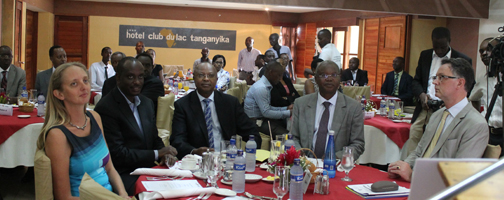Bujumbura – 5th July 2014
The EAC Secretary General (SG), in collaboration with the East African Business Council (EABC), the Burundian Federal Chamber of Commerce & Industry, with support from Trade Mark East Africa ( TMA) held the 2014 Private sector Chief Executive Officers (CEOs) luncheon with the main objectives of assessing the implementation of the previous EAC SG – CEO Forum recommendations. The luncheon was also intended to determine and prioritise the pending and emerging issues for follow up at National, Regional, Council and Summit levels, henceforth developing a time-bound action plan.
The event was enhanced by the presence of the Secretary General of EAC, Ambassador Dr. Richard Sezibera, the president of the Federal Chamber of Commerce and Industry of Burundi (FCCIB) and Vice Chairperson of EABC, Mr. Econie Nijimbere, the Ministry to the Office of the President Responsible for East African Community Affairs representative Mr. Pierre-Claver Rurakamvye; OBR Deputy Commissioner General, Mr. Edmond Bizabigomba; the French Ambassador, Mr. Gerrit Van Rossum as well as various captains of Burundi Industry.

In his opening speech, Mr. Econie Nijimbere, thanked the EAC SG for his dedication to making the voice of the Burundi private sector heard in East Africa. He encouraged all members of the sector chambers present to express their concerns openly.
Mrs. Anthe Vrijlandt, Burundi TradeMark Africa (TMA) Country Director, affirmed TradeMark Africa (TMA)’s continuous support in order to increase trade and promote a more prosperous region by shaping its interventions to be demand-driven. She mentioned projects such as infrastructure enhancements at the Port of Mombasa and Dar-Es-Salam, electronic single window and one-stop-border posts which are expected to lead to increased efficiency through time and cost savings for traders. She also pinpointed various measures in Burundi that were against trade facilitation like the high fees contract with SGS for pre-shipment inspection, the electronic cargo tracking mechanism that is not harmonized with the rest of the region and the new “security tax” of 1.15% imposed on all imported cargo to pay back for the Cotecna Scanners.
Ambassador Dr. Richard Sezibera started his speech by congratulating Burundi Private Sector for the steps achieved since last forum in 2012 in increasing the bed and conference room capacities available from 800 to 2100 rooms in 2014, easier and faster private sector start-up processes (1 day), 2013 top reforms improper based on the “Doing Business” results, among others. On the other hand, he acknowledged that there is still room for improvement for Burundi to facilitate trade like it’s done in other EAC countries. He emphasized on the need to strengthen the security especially with the coming 2015 elections by urging the private sector CEOs to sensitize and raise awareness to the political public on the different investments done so far to develop the country, to avoid unnecessary losses.
After the different speeches and presentations, there was a Q&A session where the participants had the opportunity to voice their concerns which were mainly referring to a general frustration feeling that Burundi is always behind in comparison to other EAC members. Examples like expensive air fares to travel to Burundi which can be blocking the tourism expansion, less EAC conferences thus not filling the available bed/conference room capacities, standardization of hotels, goods’ exemptions, work permit fees, issues with the export of Brarudi products to Tanzania, single visa tourist in Burundi, access to finances for women, to name a few. The EAC SG and the MPACEA representative had the opportunity to give alternatives and satisfying answers to each issue raised during the forum.
Source: TradeMark Africa (TMA)
TradeMark Africa (TMA) is an aid-for-trade organisation that was established with the aim of growing prosperity in East Africa through increased trade. TradeMark Africa (TMA) operates on a not-for-profit basis and is funded by the development agencies of the following countries: Belgium, Canada, Denmark, Finland, the Netherlands, UK, and USA. TradeMark Africa (TMA) works closely with East African Community (EAC) institutions, national governments, the private sector and civil society organisations.















